pets3听力解析4
最新公共英语三级听力试题重点讲解

最新公共英语三级听力试题重点讲解主旨大意题顾名思义,主旨大意题要求考生在听懂短文的基础上归纳出短文的主题思想,其中还包括为短文选择最合适的题目和对作者的结论或意图进行判断归纳。
这类题目主要着眼于对全篇总体上的理解。
此类题常见的提问方式有:What is the main idea/topic/subject/chief purpose of this passage?What is the best title for this passage?What does the passage tell us essentially?What is the subject they are talking about?What did the speaker mainly discuss/talk about?推理判断题这类题型要求考生根据所听到的内容推断出材料所暗示的内容,例如:情节的'发展趋势,作者的态度、倾向性等。
推断题考查思维的逻辑性,要求能够以语篇为基础进行合理的推测。
该类题型常见的提问方式如下:What will be dealt with in the following paragraph?What does the passage probably imply at the end?What can we learn/infer from the passage?What does the author impiy by saying?What does the story imply?这类题型有两个特点:一是难度高;二是逻辑性强。
推断题不仅要求考生把握原文信息,还要能够在此基础上合理地进行推断。
关键在于这个“合理”的尺度较难把握,因为大部分推断题只要求在材料论述的内容范围内进行推测。
如何过多加入自己的理解,可能会超出材料内容,选出错误的结果。
练习:Questions 1~4 are based on a short story.1. How do the housewives learn about the offer of free groceries?[A] On the radio. [B] At the supermarket.[C] From the manager. [D] From their friends.2. What did Mrs. Edwards want very much?[A] Get a basket of free goods. [B] Meet the manager.[C] Get a free basket. [D] Fill all her cupboards.3. Why did Mrs. Edwards go back to the supermarket after she had finished shopping one day?[A] Because she had to meet the manager.[B] Because she had to buy one more thing.[C] Because she had to find her shopping.[D] Because she had to pay for her shopping.4. Which of the following words best describes Mrs. Edwards feeling at the end of this story?[A] Embarrassed. [B] Disappointed.[C] Delighted. [D] Proud.听力原文All the housewives who went to the supermarket had one great ambition: to be the lucky customer who did not have to pay for her shopping. For this was what the notice just inside the entrance promised. It said:“Remember, once a week, one of our customers gets free groceries. This may be your lucky day!”For several weeks Mrs. Edwards hoped, like many of her friends, to be the lucky customer. Unlike her friends, she never gave up hope. The cupboards in her kitchen were full of things, which she did not need.In vain her husband tried to dissuade her. She dreamed of the day when the manager of the supermarket would approach her and say:“Madam, thisis your lucky day. Everything in your basket is free.”One Friday morning, after she had finished her shopping and had taken it to her car, she found that she had forgotten to buy tea. She dashed back to the supermarket, got the tea and went towards the cash desk. As she did so, she saw the manager of the supermarket approach her. “Madam,” he said, holding out his hand,“I want to congratulate you! You are the lucky customer and everything in your basket is free! ”答案:1.B 2.A 3.B 4.B。
公共英语三级历年考试真题及答案(听力理解)

公共英语三级历年考试真题及答案(听力理解)2017 下半年全国英语等级考试时间为9 月10-11 日举行,其中周六上午举办全国英语等级考试笔试科目,当天下午及次日举办口语考试,请考生参照准考证上面的考试时间,合理安排好考试作息时间。
公共英语三级的听力题型是:第三级的题型为对话和短文理解,共25 个题,形式为四选一,所占分数权重为30。
SECTION I Listening Comprehension Part A1、听音频:回答1-10 题。
Directions:This section is designed to test your ability to understand spokenEnglish. You will hear a selection of recorded materials and you must answerthe questions that accompany them. There are two parts in this section, PartA and Part B.Remember, while you are doing the test, you should first put downyour answers in your test book-let. At the end of the listening comprehensionsection, you will have 3 minutes to transfer your answers from your testbooklet to ANSWER SHEET 1.If you have any questions, you may raise your hand now as you willnot be allowed to speak once the test has started.Now look at Part A in your test booklet.Part ADirections:You will hear 10 short dialogues. For each dialogue, there is onequestion and four possible an-swers. Choose the correct answer- A, B, C orD, and mark it in your test booklet. You will have 15 seconds to answer the question and you will hear each dialogue only once.What will the woman do tomorrow?A.Hold a party.B.See Mr. Smith.C.Work overtime.D.Attend a wedding.2、Who is Mr. Johnson according to the speakers?A.Their former colleague.B.Their former neighbor.C.Their former teacher.D.Their former client.3、What are the speakers talking about?A.A job interview.B.A reporter' s work.C.How to impress people.D.How to handle an interview.4、How many flights to Sydney will there be next Tuesday afternoon?A.One.B.Two.C.Four.D.Five.5、What did the man' s teacher tell him to do?A.Polish his essay.B.Hand in his essay.C.Rewrite his essay.D.Write a shorter essay.6、What can we learn about the woman' s son?A.He often talks with his mother.B.He often drives in a careless way.C.He is willing to listen to his mother.D.He is worried about his driving skills.7、What do we know about Jack?A.He is a company manager.B.He makes emergency calls.C.He records emergency calls.D.He is a company technician.8、What can we learn from this conversation?A.The woman is paying the bill.B.Bill' s phone number is 510-1520-20.C.The man pays 20 dollars to the woman.D.The woman has a 20-dollar bill changed.9、What does the woman mean?A.The dentist' s is at a convenient place.B.The dentist's is close to Times Square.C.It was comfortable to sit at the dentist' s.D.It was not so terrible a visit to the dentist' s.10、What do we know about the woman?A.She is going to deliver a lecture.B.She spent a year in the rain forest.C.She is looking forward to the lecture.D.She will finish her report this weekend. SECTION I Listening Comprehension Part B11、What do we know about the woman's family?A.They kept a lot of birds.B.They lived in a big house.C.They owned a small farm.D.They suffered from poverty.12、What did the woman' s mother impress her with?A.Her love.B.Her success.C.Her ambition.D.Her knowledge.13、What did the woman' s mother wish her to do?A.Go to college.B.Become a writer.C.Have a better life.D.Support her family.14、Whom is the man probably complaining to?A.A receptionist.B.A travel agent.C.A coach driver,D.A hotel staff member.15、Why did the man wait in the heat for two hours?A.The coach had to be replaced.B.The coach driver felt sick.C.The hotel rooms were full.D.The hotel had to be cleaned.16、What did the man mention in his complaint?A.Impolite hotel cleaners.B.Dark light and dirty rooms.C.Rude people living downstairs.D.Disturbing noise and poor food.17、How did the man feel about the woman' s apology?A.Amusing.B.Annoying.C.Desirable.D.Reasonable.18、What did the NWHA survey aim to explore?A.The incidences of obesity.B.Popular views on obesity.C.Ways to fight obesity.D.The causes of obesity.19、How many people in the world are rated as being overweight?A.16 million.B.18 million.C.1.6 billion.D.1.8 billion.20、In which country do people feel the most pressure to be thin?A.Brazil.B.India.C.France.D.America.21、Who are most likely to blame their parents for obesity?A.The French.B.The Swiss.C.Germans.D.Russians.22、What do trendspotters do?A.Take pictures of youth culture.B.Write reports on youth culture.C.Sell products to young people.D.Create websites for young people.23、What does Look-Look concentrate on?A.Recruiting trendspotters for its clients.B.Providing advice to young trendspotters.anizing sales networks for its clients.D.Dealing in information about youth trends.24、Why do some companies use Look-Look' s images on their websites?A.To promote visits to Look-Look.B.To attract young people to their new products.C.To learn about what makes young people buy.D.To encourage young people to be photographed.25、Why is it difficult for trendspotters to catch original styles?A.Many young people like to show off.B.Many young people stick to the rules.C.Many young people try to copy trends.D.Many young people refuse to take pictures.参考答案及精析第一部分听力理解【答案】1.A2.B3.A4.B5.C6.B7.D8.D9.D 10.C 11.D 12.A 13.C 14.B 15.A 16.D 17.B 18.B 19.C 20.A 21.D 22.A 23.D 24.B 25.C【听力部分录音材料】Part A1. W: Oh, I'm sorry, Mr.Smith.M: What's up, Mary?W: I' m afraid I can' t work overtime tomorrow.John and I are holding a party for the 5th anni-versary of our wedding.M: That' s all right. Enjoy yourselves.2. W: Guess who I met at the grocery store this morn-ing?M: Well, I can' t imagine.W: Do you remember Mr. Johnson? He used to live in the building next to ours.M: Oh, yes, now I remember.He had dark hair and wore glasses.3. M: I' ve just been interviewed for a reporter' s job on the evening paper.W: What' s your overall feeling about how it went?M: Well, I think I made a good impression.It seems that they were interested in me because I' ve worked as a reporter before.4. W: Northwest Airways, good morning.Can I help you?M: Yes, do you have any flights to Sydney next Tuesday afternoon?W: Yes, there is a flight at 6:45 and one at 18:00.M: That' s fine. Could you tell me how much return flight costs?W: That would be 418 dollars.5. W: You look tired, John. What have you been doing?M: My teacher wasn' t happy with my mid-term es-say. She told me to do it all over again.W: At least, she gave you a second chance.M: Yeah, I have to admit that.6. W: I' m worried about my son at driving, but he won't listen to me.M: Well, teenagers always think they won' t get hurt, but the fact is just the opposite.W: What should I do?M: Keep talking with him and lead by an example.Parents always matter.7. W: Where is Jack? His manager is trying to catch him several times but has always just missed him.M: That' s because he is being in and out all day.W: What' s been going on?M: It has been many emergency calls and he is the ordy technician available to go out and deal with them.8. W: Can you change the bill for me please?M: Sure, 5,10,15,20. OK, 20.W: Can I have some coins? I need them for a phone call.M: Here you are.9. W: I went to the dentist' s to get my teeth polished this morning.M: How terrible !W: Well, the chair was so cleverly placed. I got a terrific view of Times Square down below. He finished the job before I knew it.10. M: I hear the guy who is going to deliver the lecture this weekend spend a year living in the rainfor-est.W: Great. I'm doing a report on the rainforest.Maybe I can get some new information to add to it.Part BQuestions 11 - 13M: Your readers are interested in your childhood.What was it like?W: I grew up in a small town. We lived in very poor housing but we lived always in very beautiful settings, so I have favorite trees and I have con-tacted with birds. My parents were farm work-ers. Though we were poor for most of part, I think I was often happy.M: It would not have been expected from that back-ground that you' 11 become a literary figure. Was your mother ambitious with you?W: Well, my mother wash' t especially ambitious with me in the sense of going to college when I grew up. I think her greatest contribution was simply that she loved me very much. No matter what happened, I had mymother with me.M: She gave you confidence.W: Oh, she did. She earned very little money, of-feting about $10 a week and never more than $ 20 a week. And in spite of that, she managed to buy a typewriter for me. She managed to buy me my first toothpaste when I left home. She just wanted me to be able to do things that she couldn' tdo even she didn' t know what they were,Questions 14 - 17W: Good morning. Can I help you?M: I' d like to make a complaint about my holiday in Paris last week.W: I' m sorry to hear that. What exactly was the problem ?M : First of all, the coach taking us to the hotel broke down and we had to wait for over 2 hours in the terrible heat before our replacement arrived.Then when we got to the hotel, we found our room hadn't been cleaned.W: Oh, dear. Did you complain to the hotel staff?M: Of course, but we were told all the cleaners were off duty. Anyway, that' s not all. The people in room above sounded like they were having all night parties every night. I demanded another room but the receptionist told me the hotel was full.W: Oh, I see.M : And the worst thing was the food in the restaurant was awful. It was so bad we had to eat out all the time despite having paid for meals in the price of our holiday.W: I do apologize. I'd like to offer you a 20% dis-count on the price of one of our autumn breaks as a gesture of good will.M: A 20% discount? You must be joking. I want to see the manager.Questions 18 - 21W: Good evening. Welcome back to Miss Know It All.For today' s program, Mr. John Smith, chairman of National Weight and Health Association, has come with findings from out recent NWHA surveyon obesity. Now, Mr. Smith, what is the purpose of your survey?M: We wanted to explore how people around the world view obesityor being overweight. Actual-ly, obesity has gone global.W: How did you do it?M: We interviewed 16,000 people in 16 countries.W: How large is the overweight population of the world according to your estimates?M: 1. 6 billion including 18 million children under age 5.W: Really surprising, isn' t it? And what are your findings about people' s attitudes regarding obe-sity?M: Our survey found that people in Brazil feel the most pressure to be thin. 83% of Brazilians think there is too much emphasis placed on weight. French are most likely to blame Americans.They use American' s fast food as an excuse for their overweight problem. Russians are most likely to blame their parents for obesity.They are followed by Germans and Indians.When asked who encouraged them to try to lose weight, the Swiss tend to exclude their doctor.W: Stay tuned for more about the NWHA survey, we will be backsoon after the break.Questions 22 - 25M: Emily, what do you do as a trendspotter?W : Very simple. Take digital photos of youth culture and send them to my company. It' s called Look-Look.M: What kind of company is it?W: It's a youth culture marketing and trend forecas-ting firm in Hollywood. I' m one of Look-Look' s 65,000 trendspotters worldwide.M: Look-Look gets a lot of information about the ever-shifting tastes of the youth market by these images.W: Yes, its clients are mostly companies. They get information about trends from Look-Look and de-velop their products. They also use the images of Look-Look on their websites to impress young people and promote their newly designed prod-ucts.M: But are there any people who don' t like their pictures to be used on the website?W: I always have my subjects' permission before I take their pictures and put up their images onto Look-Look. com.M: Where do you find your best subjects?W: At school, in the park, at local supermarkets and near many music clubs.M: What is difficult about this job?W: To catch our original styles because so many young people try hard to stand out. You have to be able to find the difference betweensomeone who is copying trends and someone who is truly inventing a new look.M: Thank you for talk with us, Emily.更多相关文章推荐:tips:感谢大家的阅读,本文由我司收集整编。
听力教程第三册Unit4部分答案

听力教程第三册Unit 4部分答案Section OnePart 2 Listening for Gist1.This dialogue is about making an appointment with Dr. Milton.2.The key words are appointment, Dr. Milton, on duty, a later time 6:15. Section TwoPart 1 DialogueTunisian holiday for amateur archaeologistsDay ActivitiesThe first day… midday, … briefing,The second day … dawn, … sunrise, … coach, … coves,… walk along the beach,… recent, … exciting sites, … fishing village, … sunsetThe third day… enjoy the town, … lovely old town, … resortThe fourth day And the fifth day … amphitheatre, … lunch, … ferry, …Islands, … sailing boats,… fishermen’s picnicThe sixth day… picnic, … port, … nightThe final say… capital, … mosaics, … Tunis International AirportPart 2 PassageExercise B: Sentence Dictation1.After more than a century of assault by humans, the wolf population had dwindled to more than a handful by the1970s in Mexico and the American southwest.2.The program is now about halfway to meeting its goal of a “wild” population of at least 100 wolves covering morethan 12,800 square kilometers.3.Decisions about mating, movement among the 45 captive-breeding facilities and release into the wild are made by aUS-Mexican committee of scientists, land owners and others.4. A wolf with rare genes – until it has successfully reproduced – will never be released because of the high mortalityrate in the wild.5.The recovery program is gradually moving away from freeing captive-born wolves, as the population of pups bornfree takes off.Exercise C Detailed Listening1.1)The research center’s known as : the Wolf Sanctuary2)Location: in Eureka, 32 Kilometers southwest of St. Louis, the United States.3)Founding: in 19714)Purpose: to restore the endangered Mexican gray wolf.5)Founder: Marlin Perkins, a world-renowned naturalist and former director of the St, Louis Zoo, and his wife Carol 2.1) The last seven known wolves were captured in the wild or taken from zoos to begin the breeding program.2) The first captive-bred litter of Mexican gray wolves produced in the federal program was born at thewild CanidCenter.3) The first release into the wild took place.Section ThreeNews Item 1Exercise AThis news item is about the New York times winning seven Pulitzer prizes in journalism.News Item 2Exercise AThis news item is about the Smithsonian’s Jazz Appreciation Month.Exercise BCoincides with, performers, promote, assist,Organizers, schools, local museums, libraries, musicians, concert halls, radio stations, presenting, concerts, composers, musicians, JazzNews Item 3Exercise AThis news item is about an African American history museum showing the struggles and contributions of African Americans.Exercise BF T F F T T F TSection FourPart 1Exercise AThis radio program is about singer Norah Jones’ background and her popularity now.Exercise BA Gifted SingerName Norah JonesPlace of growing up TexasHer parents Father: a famous Indian musicianMother: an American womanPlace of her establishment New YorkThe feature of her songs A combination of jazz, pop, country folkand soulThe name of her new album“Come Away with Me”Part 2PassageExercise B Sentence Dictation1. A blur of gold was spotted through the high, wind-whipped grasses and off we walked toward the lion’s den.2.He couldn’t stop smiling as we crept closer into the glow of the day’s last light.3.Just a meter away from the lions a straggling buffalo loped by, but our appearance seemed to distract them and thebuffalo got away.4.Under an open sky we winded our way through cracked sun-baked pathways. Our guides knelt in the sand, pointingout the differences between the various animal tracks.5.Thrashing in the water a mauve-colored hippo grunted, snapped his giant jaws, and lunged forward. We kept ourdistance behind a log on the banks of the river.Exercise C Detailed Listening1.They experienced the African bush on foot.2.Seeing lions was a special treat for them.3.They saw 10 lions sitting in a semicircle in the grass.4.Kruger National Park stretches for almost 2.5 million hectares, roughly the size of Wales.5.They stayed in a thatched roof two-person huts with toilets and hot showers.6.Dinner was served around an open fire.7.They saw a crocodile sunning on a rock not far from where they had been swimming the day before.8.They were all on a high from their lion sighting.。
公共英语三级听力技巧解析
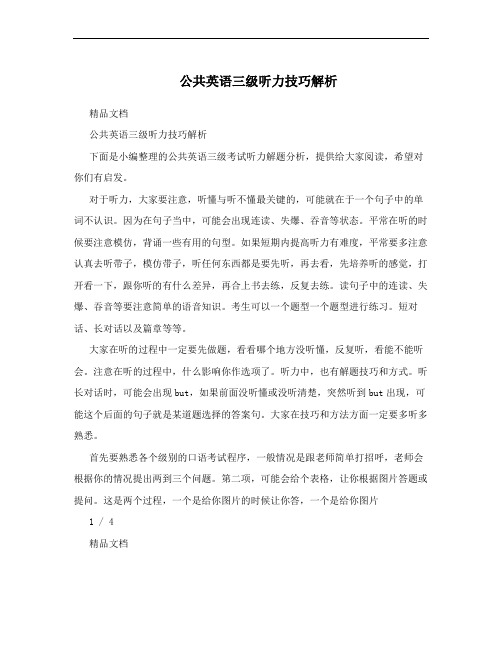
公共英语三级听力技巧解析精品文档公共英语三级听力技巧解析下面是小编整理的公共英语三级考试听力解题分析,提供给大家阅读,希望对你们有启发。
对于听力,大家要注意,听懂与听不懂最关键的,可能就在于一个句子中的单词不认识。
因为在句子当中,可能会出现连读、失爆、吞音等状态。
平常在听的时候要注意模仿,背诵一些有用的句型。
如果短期内提高听力有难度,平常要多注意认真去听带子,模仿带子,听任何东西都是要先听,再去看,先培养听的感觉,打开看一下,跟你听的有什么差异,再合上书去练,反复去练。
读句子中的连读、失爆、吞音等要注意简单的语音知识。
考生可以一个题型一个题型进行练习。
短对话、长对话以及篇章等等。
大家在听的过程中一定要先做题,看看哪个地方没听懂,反复听,看能不能听会。
注意在听的过程中,什么影响你作选项了。
听力中,也有解题技巧和方式。
听长对话时,可能会出现but,如果前面没听懂或没听清楚,突然听到but出现,可能这个后面的句子就是某道题选择的答案句。
大家在技巧和方法方面一定要多听多熟悉。
首先要熟悉各个级别的口语考试程序,一般情况是跟老师简单打招呼,老师会根据你的情况提出两到三个问题。
第二项,可能会给个表格,让你根据图片答题或提问。
这是两个过程,一个是给你图片的时候让你答,一个是给你图片1 / 4精品文档的时候让你问。
不管跟你一起考试的伴儿跟你配合得如何,千万不能因为他影响你的正常发挥。
PETS二级以上开始有随机性的问题,根据所答篇目,每个步骤每个级别有严格的时间限制,一个问题没有答出来,千万不要影响其他五个问题的发挥。
做口语过程当中希望大家注意到一点,说话不能特别少,如果说话特少的话,你就处于比较被动的状态,老师可能评分比较难一些。
对你能不能过这个考试就成了个问号。
第二个,说话过多也不是一件很好的事。
如果说话过多的话,会暴露组织语言的用词、语法等等问题。
大家在做PETS口试时,建议大家还是要在口语老师的指点之下,多背一些经典的模板,不会的时候可以让他去重复,用英语去说都可以。
最新 PETS三级听力测试命题分析及探究

PETS三级听力测试命题分析及探究在听力这一部分中,考生要做到以下几点:1.理解主旨要义(M代表男声,W代表女声.0代表问题。
以下同)例如,你将会听到如下的录音材料:M: I bought you a suit for our anniversary.W: Thank you, Bill, I love you.Q: Who bought a suit?下面有3个备选答案:[A] She bought him a suit.[B] He bought himself a suit.[C] He bought her a suit.从对话中我们可知,男士Bill为他的妻子买了一件衣服,作为结婚一周年的礼物,所以正确答案是[C]。
2.获取事实性的具体信息例如,你将会听到如下的录音材料:M: Excuse me. Can you tell me how much the shirt is.’?W: Yes. It’s nine fifteen.Q: How much is the shirt?下面有3个备选答案:[A]£19.15.[B]£9.15.[C]£9.18.从对话中我们可知,衬衫的价格是9镑l5便士,所以正确答案是[B]。
3.推断讲话者的关系当谈话的一方用比较含蓄的方式表达自己的意思时,就不能只从表面上寻找问题的答案了。
这时候,考生需要根据对话中的关键词、上下文及人物的语气、语调等隐性成分进行推断。
一般来说,第三级考试的听力部分重点在于对事实性信息的获取,推测和判断的题目比较少,但是对于这一类试题,考生也不可以忽略。
例如,你将会听到如下的录音材料:W: What can I do for yo u, sir.’?M: I want some beef and...根据两个人的对话内容和语气,我们可以推断出这个女子是一个餐厅的服务员,而那位男士则是来用餐的顾客。
4.分析对话者的观点或态度这一类试题的答案也是由推导得出的。
公共英语三级PETS3级听力讲义

全国英语等级考试(三级)PETS-3听力精讲新世纪教育公共英语三级(pets3)包过 q17951073主讲人:张志健目录一、题型概述二、A 节短对话三、B节长对话、短文四、复习指导一、题型概述听力部分大纲要求与考查点大纲要求考查点理解主旨要义;考查对文章大意和中心思想的理解能力;获取事实性的具体信息;考查从听力材料中获取事实细节的能力;理解明确表达的概念性含义;考查根据听力材料内容提炼并理解概念、定义等的能力;进行有关的判断、推理和引申;考查在理解听力材料的基础上,对说话人的身份、职业、与对话人的关系、事件发生的地点和时间等进行判断、推理和引申的能力;理解说话者的意图、观点或态度。
考查分析说话者措辞、语气和语调,推断说话者的意图、观点或者态度的能力。
⏹题目数量15道题,4段长对话或者短文⏹篇幅时间总长800词,每段平均约200词,持续8'30″⏹所占分值15分⏹答题要求每题有15秒答题时间(5秒用作听前读题,10秒用作听后答题)。
每段录音材料只播一遍。
Section IListening☐题目数量10道题,10段短对话☐篇幅时间总长400词左右,约3'30″☐所占分值10分☐答题要求每题有15秒答题时间(5秒用作听前读题,10秒用作听后答题)。
每段录音材料只播一遍。
A 节短对话B 节长对话、短文二、A节短对话提问方式通常为以What, When, Where, Why, Who,How等开头的特殊疑问句,如:What is the woman doing at the moment?When will the bank open on Sundays?Where is the man`s house located?Why is the woman angry with her son?How does the man feel about his grade?问题类型是什么?什么时间?什么地点?谁?什么原因?什么态度?……行为内容题(what)、时间数字题(when)、场所地点题(where)、职业身份题(who)、原因动机题(why)、态度立场题(how)短对话的“潜规则”1. 推理原则一般情况需要对对话进行推理,因此在短对话中,“所听非所得”。
听力教程第三册答案UNIT4

Unit 4Section One Tactics for ListeningPart 1 Spot DictationStephen Powelson’s Amazing MemoryWhen Stephen Powelson was nine, his school organized a (1) weekly contest in memorizing passages from the Bible. Stephen paid (2) no attention until he was chided* for (3) not competing. The next Sunday he surprised everyone by (4) reciting all the passages for the (5) entire year.As a teenager in prep school, Stephen took Greek. His teacher (6) assigned 21 lines of the Iliad* to be memorized (7) in a week. At the end of the hour - though he (8) insisted he paid full attention to the (9) lecture - Stephen knew all 21. He went on to memorize the first (10) 100 lines.In 1978, for the first time (11) since college, Powelson, now 60, had some (12) spare time. To keep his mind active, he reread the Iliad and (13) discovered that he still knew the first 100 lines (14) by heart.That someone could memorize so much between ages 60 and 70 is (15) astonishing to most people, who are (16) convinced that memory (17) worsens as we grow older.Powelson's method is to (18) read a book into his tape recorder, then read it several more times, making sure he understands (19) each word. "Also," he says, "I attempt to (20) visualize myself as part of the action."Part 2 Listening for GistWoman: Surgery.Stone: Good afternoon. My name's Frank Stone. I want to make an appointment to see Dr Milton please.Woman: Yes, of course, Mr Stone. May I have your address please?Stone: 118 Hill Road, London, S.E.18.Woman: Yes, we have you ·on the records. Can you manage this afternoon at 5:30?Stone: I'm afraid not. I can manage tomorrow.Woman: I'm afraid Dr Milton's not on duty tomorrow. He'll be here the day after. That's Thursday, March 27th.Stone: Fine.Woman: Will 5:30 be all right?Stone: Well, yes, but I'd prefer a later time so I can come along after work. Woman: Then what about 6: 15?Stone: Well, that's fine. Thank you. Goodbye.Woman: Goodbye.ExerciseDirections: Listen to the dialogue and write down the gist and the key words that help you decide.1)This dialogue is about making an appointment with Dr Milton.2)The key words are appointment. Dr Milton. on dutv. a later time 6:15.Section Two Listening ComprehensionPart one DialogueTunisian Holiday(Someone is enquiring about the Tunisian holiday.)Agent: Hello, Bath Travel.Client: Hello, I'd like to find out more about your Tunisian holiday for amateur archaeologists. I've read about it in the paper, but I'd like to know more aboutwhat is involved.Agent: You mean you'd like to know the itinerary?Client: Yes, that's right.Agent: All right. Just briefly, you arrive in Tunis at midday on the first day and go by coach to La Marsa. Then there is a short briefing by the archaeologist and then the rest of the day you are free to explore.The second day you get up before dawn and go to Carthage to see the sunrise. You have breakfast and a lecture there and then go by coach to Mansoura, where there are beautiful coves. After lunch you can walk along the beach, to Kerkouane. The walk takes about four hours. Kerkouane is one of the most recent and most exciting sites. Then by coach to Kelibia, a fishing village, in time for sunset over the harbor.Client: That sounds rather a long walk.Agent: Well, it's an easy walk. Flat all the way, and very pretty. But you can go by coach, if you prefer. The third day you spend in Hammamet on Cap Bon, and the day is free to enjoy the town. It's a lovely old town and resort. And the fourth day you take the coach to the ruin of EI Djem, which is a magnificent amphitheatre*. You have lunch in Sfax and then you take the ferry to the beautiful Kerkennah Islands.Client: Islands, you say?Agent: Yes, they're very peaceful and you spend the fifth day there. The fishermen will take everyone out on their sailing boats and there will be afishermen's picnic. On the sixth day you visit the Great Mosque of Kairouan and have a picnic lunch. Then take the coach to the lovely port of Bizerte for the last night. And the final day there is a visit to the ancient Roman capital of Utica with its fantastic mosaics* and then a coach to Tunis International Airport. Client: Have you got a full brochure which gives more details?ExerciseDirections: Listen to the dialogue and complete the following itinerary.Part 2 PassageMexican Gray Wolf1)After more than a century of assault by humans, the wolf population haddwindled to no more than a handful by the 1970s in Mexico and theAmerican southwest.2)The program is now about halfway to meeting its goal of a "wild"population of at least 100 wolves covering more than 12,800 squarekilometers.3)Decisions about mating, movement among the 45 captive-breeding facilitiesand releases into the wild are made by a US-Mexican committee ofscientists, land owners and others.4)A wolf with rare genes - until it has successfully reproduced - will never bereleased because· of the high mortality rate in the wild.5)The recovery program is gradually moving away from freeingcaptive-born wolves, as the population of pups born free takes off.Francisco and Sheila were pioneers in a federal program in Eureka, 32 kilometers southwest of S1. Louis, the United States, to restore the endangered Mexican gray wolf, the rarest and most genetically distinct subspecies of gray wolf in North America.After more than a century of assault by humans, the wolf population had dwindled to no more than a handful by the 1970s in Mexico and the American southwest.The research center, popularly known as the Wolf Sanctuary*, was foundedin 1971 by Marlin Perkins, a world-renowned naturalist and former director of the St. Louis Zoo, and his wife Carol. Besides the Mexican wolf, the sanctuary works with the endangered red wolf, named wolf, swift fox / and African wild dogs.In the late 1970s, the last seven known wolves were captured in the wild or taken from zoos to begin the breeding program. In 1981, the first captive-bred litter of Mexican gray wolves produced in the federal program was born at the Wild Canid Center, and the first release into the wild took place in 1998. The program is now about halfway to meeting its goal of a "wild" population of at least 100 wolves covering more than 12,800 square kilometers.Though in captivity themselves, Francisco and Sheila taught their pups so well that many are thriving in the wild. They were ideal parents. They raised 25 babies, taught them good survival skills and sent many of them off to live on their own.Nine of Francisco and Sheila's offspring were among the first 11 captive-born Mexican gray wolves released in 1998. Both parent wolves have since died - Francisco at age 14 in December. Sheila at age 16 in June 2000 - but they lived, as captive wolves often do, roughly twice as long as wolves in the wild. Today the Wild Canid Survival and Research Center in Eureka estimates that 98 percent of Mexican wolves released from the federal program are descendants of the prolific* lobo* pair.About 250 lobos now live in captivity at 45 US and Mexican facilities. TheWild Canid Center, however, has produced more puppies and housed more Mexican grays than any other facility.The Wild Canid Center is ideated* on 25 isolated hectares within Washington University's Tyson Research Center. The wolves live in large outdoor enclosures with minimal human contact. They learn to hunt, raise young, live in natural family packs, and to be suspicious of people - all necessary skills for surviving in the wild.Decisions about mating, movement among the 45 captive-breeding facilities and releases into the wild are made by a US-Mexican committee of scientists, land owners and others. They also maintain a genetic database. A wolf with rare genes - until it has successfully reproduced - will never be released because of the high mortality rate in the wild. It's not uncommon for freed wolves to be struck by cars or shot by hunters; in recent weeks, five have died.Despite the losses, released wolves are reproducing. The recovery program is gradually moving away from freeing captive-born wolves, as the population of pups born free takes off. Scientists want to let nature decide what's a good wolf and what's not through natural selection.Exercise A Pre-listening QuestionThe wolf is a large member of the canine family. Most of the adult grey wolves weigh in the vicinity of 75 to 125 pounds (34 to 56 kilograms). Wolves live in family groups called packs. A pack is usually made up of a male parent, a femaleparent, their pups and a few other adult wolves who are the older brothers and sisters. Wolves can run up to 40 miles an hour and can easily cover 50 miles a day.The wolf has developed the capacity to survive in the most inhospitable of climates. The wolves in the high arctic endure several winter months of perpetual darkness. Even in February when the sun returns to the north, temperatures of -40°C and bitter winds are common. In the wild wolves can live up to 13 years or more; in a protected wolf park or a controlled area of land, a wolf can live to be up to 16 years old. Exercise B Sentence Dictation Directions: Listen to some sentences and write them down. You will hear each sentence three times.Exercise C Detailed Listening1 Directions: Listen to the passage and complete the information about a Mexican gray wolf research center.1)The research center's known as: the Wolf Sanctuary2) Location: in Eureka. 32 Kilometers southwest of St. Louis. the United States3) Founding: in 19714) Purpose: to restore the endangered Mexican gray wolf5) Founder: Marlin Perkins. a world-renowned naturalist and formerdirector the St. Louis Zoo. and his wife Carol2. Directions: Fill in the blanks with events connected with the following timeexpressions.1)In the late 1970s: The last seven known wolves were captured in the wild ortaken from zoos to begin the breeding program.2)In 1981: The first captive-bred litter of Mexican gray wolves produced in thefederal program was born at the wild Canid Center.3)In 1998: The first release into the wild took place.Exercise D After-listening DiscussionDirections: Listen to the passage again and discuss the following questions.1)Francisco and Sheila were pioneers in a federal program. Though in captivitythemselves, they taught their pups so well that many are thriving in the wild.They were ideal parents. They raised 25 babies, taught them good survival skills and sent many of them off to live on their own. Nine of Francisco and Sheila's offspring were among the first 11 captive-born Mexican gray wolves released in 1998. Both parent wolves have since died - Francisco at age 14 in December. Sheila at age 16 in June 2000 but they lived, as captive wolves often do, roughly twice as long as wolves in the wild.The Wild Canid Center is ideated on 25 isolated hectares within.Washington University's Tyson Research Center. Today the Wild CanidSurvival and Research Center estimates that 98 percent of Mexican wolves released from the federal program are descendants of the prolific lobo pair.About 250 lobos now live in captivity at 45 US and Mexican facilities. The Wild Canid Center has produced more puppies and housed more Mexican grays than any other facility. Other large US newspapers were singled out too, including the Wall Street Journal, which won the Pulitzer for breaking news, despite being displaced from its offices at the World Trade Center. The Washington Post received Pulitzers in two categories, investigative and national reporting.(Open)Section Three NewsNews Item1Pulitzer Prize *The Pulitzer board has singled out the New York Times in a year when more than half of the eht fo egarevoc ot tnew msilanruoj ni sezirp suoigitserpeht dna setatS detinU eht dna ytiC kroY weN no stceffe sti ,skcatta htrebmetpeS11.natsinahgfA ni rawColumbia University Professor of Journalism, Seymour Topping, announced the winners:"In the fourteen journalism categories, the New York Times, after being accorded a record number of jury nominations, that is 12, was awarded seven prizes. That is more than any newspaper has received in a single year dating back to the institution of the prizes in 1917." The Pulitzer board also recognizes literary works. This year, David McCullough won for his biography John Adams. Richard Russo received a Pulitzer for Empire Falls, in the category of distinguished fiction by an American author.Exercise ADirections: Listen to the news item and complete the summaryThis news item is about the New York Times winning seven Pulitzer prizes in journalism.Exercise BDirections: Listen to the news again and answer the following questions.1.The New York Times won seven Pulitzer prizes.2.The New York Times received this honor for its coverage of the September11th attacks and theeffects of the attacks on New York City and the United States and the war in Afghanistan.3.It was established in 1917.4.Yes, there were. They were the Wall Street Journal and the Washington Post.5.Literary works is also recognized by the Pulitzer board.6.They are John Adams and Empire Falls.News Item2Jazz MouthThe Smithsonian*'s Jazz Appreciation Month coincides with the April birthdays of legendary performers such as Dizzy Gillespie, Duke Ellington and Ella Fitzgerald. Grammy Award-winning saxophonist Branford Marsalis has joined with the Museum of American History to help promote the event, and assist with educational outreach*.Branford hopes the program will inspire intellectual curiosity among younger children, as well as an appreciation for the rich history of jazz for all ages.Branford Marsalis has helped bring jazz to the masses, as the band leader for the Tonight Show late-night television-talk program, and for his work in the studio and on stage with British rock star, Sting.Organizers of the Smithsonian's Jazz Appreciation Month hope that similar programs will be initiated around the country by schools, local museums, libraries, musicians, concert halls and radio stations. Here in the Nation's Capitol, the Smithsonian Jazz Masterworks Orchestra will be presenting a series of concerts during April, focusing on the greatest composers and musicians from every era of jazz.Exercise ADirections: Listen to the news item and complete the summary.This news item is about the Smithsonian's Jazz. Appreciation Month.Exercise BDirections: Listen to the news again and complete the following passage.The Smithsonian's Jazz. Appreciation Month coincides with the April birthdays of legendary performers such as Dizzy Gillespie, Duke Ellington and Ella Fitzgerald. Grammy Award-winning saxophonist Branford Marsalis has joined with the Museum of American History to help promote the event, and assist with educational outreach .Organizers of the Smithsonian's Jazz Appreciation Month hope that similar programs will be initiated around the country by schools, local museums, libraries, musicians, concert halls and radio stations. Here in the Nation's Capitol, the Smithsonian Jazz Masterworks Orchestra will be presenting a series of concerts during April, focusing on the greatest composers and musicians from every era of Jazz.News Item3African American History MuseumAn old Greyhound Bus* terminal sits unused in the heart of downtown Dothan, Alabama. It's hardly noticeable, nestled between two office buildings and surrounded by a chain link fence. There are no written signs that hint of the structure's controversial history. Four decades ago it was a symbol of racial segregation. During the 1960s, bus terminals like other public facilities throughout the American south were divided into white areas and black areas. The building still has the separate entrance and restroom facilities that black customers were legally required to use. Today, those elements have a different social value, and they will become one of the centerpieces of a new African American history museum.The museum will include galleries devoted to the accomplishments of George Washington Garver* and other black scientists and inventors. There will be a gallery depicting black heroes of military and social campaigns.And the city of Dothan is helping. It's providing the museum with some financial support, and it's already promoting the attraction to visitors. The G-W Carver Interpretive Museum should open doors by August and its director Francina Williams hopes to capitalize on Alabama's historic role . the center of America's Civil Rights movement. When visitors come to Birmingham, Selma and Montgomery to learn about the struggles that African Americans have endured, she would like them I make a side trip to Dothan to see what African Americans have contributed to Alabama, America Id the world.Exercise ADirections: Listen to the news item and complete the summary.This news item is about an African American history museum showing the struggles and contributions f African Americans.Exercise BDirection: Listen to the news again and decide whether the following statements are true (T) or false (F).1.F2. T3. F4.F5.T6. T7. F8.TSection Four supplementary ExercisesPart 1 Feature ReportSinger Norah JonesWith her smoky voice and storyteller's approach to writing, Norah Jones blends jazz, pop, country folk and soul. The online music site CD Now describes her as "a relative rarity, a rock singer who fits perfectly in a low-key jazz context."Growing up in Texas, Norah attended the Booker T. Washington High School for the Performing Arts, then majored in jazz piano at the University ofNorth Texas before heading to New York City. Norah comments, "The music scene there is so huge and exciting. Everything opened up for me, and I couldn't leave." Norah wrote songs and played in nightclubs. In 2000, she put a demo tape together, and that led to a contract with Blue Note, the famous jazz label.Norah likes to downplay* the fact that she's the daughter of the famed Indian musician Ravi Shankar. He played a marginal role in her childhood, and she was brought up by her American mother. Norah admits, "I love my dad, but I didn't grow up with him and my music has nothing to do with him. I just don't want that to be the focus."Norah was influenced by jazz, pop and rhythm and blues, and classic vocalists* such as Aretha Franklin, Billie Holiday and Nina Simone. Her new album Come Away With Me features her own songs, as well as covers by diverse artists and songwriters such as J. D. Loudermilk, Hank Williams and Hoagy Carmichael.Norah Jones has been receiving rave reviews in publications such as Entertainment Weekly and The New York Times magazine. Rolling Stone magazine included her in their recent article, "The Next Wave: 10 Artists To Watch."Norah says, "I feel like this record is a pretty full expression of where I am now. I don't know if it can be classified as jazz or pop music. Hopefully, it can be appreciated by fans of both. It has lots of different elements. In the end though, it's all about the songs."Exercise ADirections: Listen to the radio program and complete the summary.This radio program is about singer Norah Jones' background and her popularity now.Exercise BDirections: Listen to the program again and complete the following form.A Gifted SingerPart 2 PassageSafari1)A blur of gold was spotted through the high, wind-whipped grasses and off wewalked toward the lion's den.2)He couldn't stop smiling as we crept closer and closer into the glow of theday's last light.3)Just a meter away from the lions a straggling buffalo loped by, but ourappearance seemed to distract them and the buffalo got away.4)Under an open sky we winded our way through cracked sun-baked pathways.Our guides knelt in the sand, pointing out the differences between the various animal tracks.5)Thrashing in the water a mauve-colored hippo grunted, snapped his giantjaws, and lunged forward.We kept our distance behind a log on the banks of the river.A blur of gold was spotted through the high, wind-whipped grasses and off we walked toward the lion's den*. We glanced at each other nervously, but forged ahead. My friends and I had come to experience the African bush on foot, so, gulping, we fell in shaky step behind our two ranger guides. Their rifles were at the ready. So were our zoom lenses. Seeing lions was a special treat, even for our veteran guide, and he couldn't stop smiling as we crept closer and closer into the glow of the day's last light.About 150 meters ahead we counted 10 lions sitting in a semicircle in the grass. Their heads poked up through the grass thicket, listening, aware.Just a meter away from the lions a straggling* buffalo loped by. Perhaps the lions' intended dinner? But our appearance seemed to distract them and the buffalo got away.We were in the Kruger National Park*, the largest game park in SouthAfrica, on a guided walking safari.Kruger National Park is the country's main game* reserve. Roughly the size of Wales, it stretches for almost 2.5 million hectares across a maze of ecozones from flat scrubby bush, dense shrub-like Mopane tree covered hillsides to lush valleys.For three nights home was a circle of thatched roof two-person huts tucked behind a leafy grove of trees in an enclosed camp that included toilets and hot (mostly) showers.Dinner was served around an open fire, a massive kettle of hot water for tea or coffee steaming on a nearby pile of smoldering coals.The only light after dark were swaths of luminous stars overhead and our kerosene* lanterns.We joked that we had arrived to the catered version of "Survivor".The first morning we climbed out from beneath mosquito nets to the muffled sounds of an elephant munching on a tree behind our huts, which were separated only by several meters and a wire mesh fence.As if the elephant was not wake-cup call enough, outside each hut a jug of water had been poured into a plastic basin for a quick face wash before hitting the trails.Under an open sky we winded our way through cracked sun-baked pathways through baobab* and kudu* berry trees. Our guides knelt in the sand,pointing out the differences between the various animal tracks.A line in the sand told a crocodile had recently slipped into a nearby pool.Later we saw a crocodile sunning on a rock not far from where we had been swimming the day before.In the same area we had a sunset sighting of a mauve*-colored hippo* who was not happy to see us.Thrashing in the water he grunted, snapped his giant jaws, and lunged* forward. We kept our distance behind a log on the banks of the river where we later got a glimpse at a family of baboons*.On our last evening streaks of orange made the sky glow as if on tangerine* fire. We were all on a high from our lion sighting.I inhaled the colors, the silhouette* of buffalos grazing near a watering hole, the evening dropped in temperature and squeezed a friend's hand.Exercise A Pre-listening QuestionHere are the top parks for anAfrican safari:The beautiful Masai Mara National Reserve in Kenya, the world-famous Serengeti National Park and Ngorongoro Crater in Tanzania, the lush green Okavango Delta and Chobe National Park in Botswana and the Etosha National Park in Namibia.Exercise B Sentence DictationDirections: Listen to some sentences and write them down. You will hear eachsentence three times.Exercise C Detailed ListeningDirections: Listen to the passage and answer the following questions.1)They experienced the African bush on foot.2)Seeing lions was a special treat for them.3)They saw 10 lions sitting in a semicircle in the grass.4)Krugge National Park stretches for almost 2.5 million hectares ,roughly thesize of Wales.5)They stayed in a thatched roof two- person huts with toilets and hot showers.6)Dinner was served around an open fire.7)They saw a crocodile sunning on a rock not far from where they had beenswimming the day before.8)They were all on a high from their lion sighting.Exercise D After-listening DiscussionDirections: Listen to the passage again and discuss the following questions1. They saw lions, buffaloes , elephants, crocodiles, hippos, baboons, etc.2.(Open)。
2023年6月英语四级听力第三套
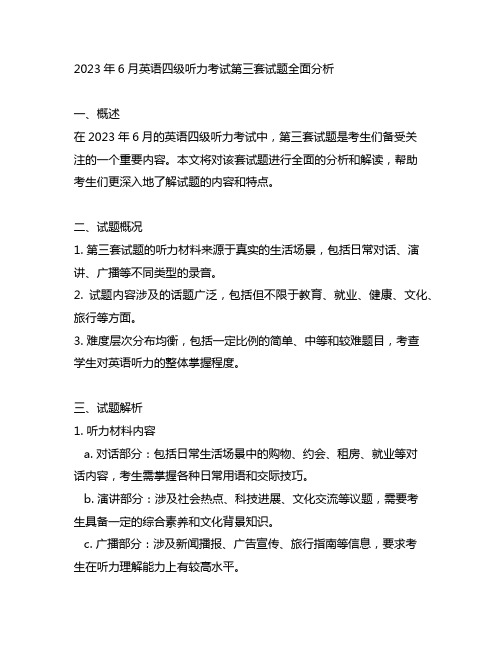
2023年6月英语四级听力考试第三套试题全面分析一、概述在2023年6月的英语四级听力考试中,第三套试题是考生们备受关注的一个重要内容。
本文将对该套试题进行全面的分析和解读,帮助考生们更深入地了解试题的内容和特点。
二、试题概况1. 第三套试题的听力材料来源于真实的生活场景,包括日常对话、演讲、广播等不同类型的录音。
2. 试题内容涉及的话题广泛,包括但不限于教育、就业、健康、文化、旅行等方面。
3. 难度层次分布均衡,包括一定比例的简单、中等和较难题目,考查学生对英语听力的整体掌握程度。
三、试题解析1. 听力材料内容a. 对话部分:包括日常生活场景中的购物、约会、租房、就业等对话内容,考生需掌握各种日常用语和交际技巧。
b. 演讲部分:涉及社会热点、科技进展、文化交流等议题,需要考生具备一定的综合素养和文化背景知识。
c. 广播部分:涉及新闻播报、广告宣传、旅行指南等信息,要求考生在听力理解能力上有较高水平。
2. 出现频率较高的考查点a. 数字、时间、日期等具体信息的获取和理解。
b. 主旨大意的把握与概括。
c. 各类修辞手法的应用和理解。
d. 各种语气和情感色彩的表达和分辨。
3. 解题技巧a. 注意细节:在听力过程中,要特别注重对细节信息的抓取和准确理解,这些信息往往是选择题和填空题的依据。
b. 整体把握:不仅要理解每一个句子或者每一个片段的内容,还要注重抓住整体语境和主题大意。
c. 积累常用表达:平时积累一些常用的英语表达和习惯用语,对于听力理解和回答问题有一定帮助。
四、备考建议1. 提前了解试题形式和特点,制定针对性的复习计划,合理安排时间,适当调整心态。
2. 多听多练:平时多听一些英语广播、新闻、电视剧等,提高自己的听力水平和语感。
3. 听力技巧训练:可以寻找一些专门针对英语听力的训练资料,进行针对性的听力练习。
4. 查漏补缺:不断总结巩固知识点,同时查漏补缺,及时纠正错误。
五、结语2023年6月英语四级听力考试第三套试题的分析,希望能够帮助考生更好地备考和应对考试,希望每一位考生都能取得理想的成绩,加油!六、应对解题技巧强化1. 重视细节把握:在听力过程中,考生要能够快速而准确地抓住细节信息。
新视野大学英语视听说教程3(第三版)Unit 4 test听力原文和答案

Unit 4 testNextDirections: Click on the speaker to the left to start playing the audio recordingsParts I, II and III. They will be played continuously. Once the recording starts playi Array please do NOT click on either the speaker icon or the 'Unit Quiz' link in the menuabove. Otherwise, you may lose the chance of hearing the complete recording.Part IDirections: Listen to the short dialogs, and then choose the correct answers to the questions. You will hear the recording twice. After the first playing, there will be time for you to choose the correct answers. Use the second playing to check your answers.1.(Listen to the audio recording for the question.)A. They are taking photos.B. They are barbecuing.C. They are playing with the woman's sister.D. They are looking at photos.2.(Listen to the audio recording for the question.)A. The man's mom will always scold him when he and his brother fight.B. The man's mom will always scold his brother when they fight.C. The woman's sister is very naughty.D. The woman sometimes fights with her little sister.3.(Listen to the audio recording for the question.)A. The woman thinks parents shouldn't allow children to watch TV at all.B. The man's child is a couch potato.C. The woman's child doesn't like watching TV.D. The man encourages his child to work out to reduce the time spendingon TV.4.(Listen to the audio recording for the question.)A. Husband and wife.B. Daughter and father.C. Mother and son.D. Two colleagues.5.(Listen to the audio recording for the question.)A. One had better forget the divorce.B. One should find a new spouse as early as possible.C. Divorce is very painful.D. Divorce is not very painful.Part IIDirections: Listen to the passage three times. When the passage is read for the first time, listen for the general idea. When the passage is read the second time, fill in the blanks numbered from S1 to S7 with the exact words you hear.For blanks numbered from S8 to S10, write down either the exact words you hear or the main points in your own words. When the passage is read the third time, check your answers.In a powerful new Mercedes a married couple are driving along a highwayHer husband suddenly looks over at her. From theand themoment. He says, "been married for 20 years, but I want aThe wife says nothing, but slowly increases the(8)He then says, "Again the wife stays quiet, but speeds up as her rage increases."I want the house," he insists, pressing his luck.The wife speeds up to 80 mph.He says, "I want the car, too," but she just drives faster and faster.By now she's up to 90 mph.(9)"All right," the man says, "The wife slowly starts to veer toward a bridge.This makes him a bit nervous, so he says, "Isn't there anything you want?"The wife says, ""Oh, really," he says, "So what have you got?"Seconds before they slam into the bridge at a speed of 100 mph, the wife smiles and says, "The airbag."Part IIIDirections: Listen to the following recording, and then choose the correct answers to the questions. You will hear the recording twice. After the first playing, there will be time for you to choose the correct answers. Use the second playing to check your answers.1. What is the passage mainly about?A. The importance of remarriage.B. The reasons for a remarriage.C. Ways of preparing for a blended family.D. Children's problems in a blended family.2. How will children view the man their single mother is dating if she says"we're just friends"?A. They will find the man threatening.B. They will leave home.C. They will treat the man as a friend.D. They will be eager to have a new father.3. How can single parents benefit from advice?A. They can make up their minds to find a new spouse quickly.B. They can see the issue from a new angle.C. They will understand their former spouse better.D. They can give their new spouse a surprise.4. According to the passage, which of the following is true in the case ofa divorce?A. Children are sadder than parents.B. Parents are sadder than children.C. Younger children have more problems than older children.D. Older children have more problems than younger children.5. Which people are mentioned in the passage who must make adjustments in ablended family?A. The stepparent and the biological parent.B. The stepparent and the children.C. The biological parent and the children.D. The stepparent, the biological parent, and the children.Part IVDirections: Choose the best answer to each of the following statements.1.Amy, sit down. We need to talk. Your mother and I are going to _________.A. separateB. separate with each otherC. divorce ourselvesD. divorce with each other2.So you're still single? If you ________ to me and used the Internet, you'dhave had a husband by now.A. listenB. have listenC. have listenedD. had listened3.I _________ an online ad that read, "Husband Wanted".A. putB. postedC. positionedD. pressed4.I do have a right _____ stability for my children and myself, don't I?A. inB. forC. toD. at5.Do you yell at him and call ______________?A. him namesB. his namesC. him nameD. his naming6.Remarriage was the ______ thing I'd consider for two years after my divorce.I had heard about the high rate of remarriage failures.A. finalB. eventualC. lastingD. last7.As time ________, my son gradually grew up, and he became conscious of myloneliness and anxiety.A. went byB. went pastC. passed overD. passed through8.____________ he said this, I ignored him.A. In the first timeB. The first timeC. The first time whenD. At the first time when9.Our kids are being teased by other kids at school because we can't dressthem _____ the current fashions!A. withB. byC. inD. for10.I hope you won't hesitate and let golden opportunities slip _______ yourfingers.A. inB. overC. alongD. through。
全国英语等级考试PETS3三级听力重难点讲解(4)

全国英语等级考试PETS3三级听力重难点讲解(4)导读:本文全国英语等级考试PETS3三级听力重难点讲解(4),仅供参考,如果觉得很不错,欢迎点评和分享。
转折题型这种题型出现的频率很高,其特征是:第一个说话人所说的不是十分重要;第二个说话人的答话由两部分组成:先是一个简单的短句,紧接着是一个较长的句子,短句与长句之间常用but, though, however等转折意思的词语连接,从而引起的作者态度及谈论重点的变化。
人物身份题型在这类对话中,由于说话人之间的关系不同,其用词、造句、语气都有区别。
这是听录音时要抓的关键之一,在此基础上再捕捉有关信息,然后判断、推测人物之间的关系及其身份。
这类题比较简单,考生只要抓住那些与职业和身份有关的关键词即可回答。
这类题目与询问地点的考题有类似之处。
常见的提问形式有:Who is the man/woman?What is the man’s/woman’s job/profession/occupation?What is the probable relationship between the two speakers?Who is the man/woman most probably speaking to?考题中常涉及的职业或人物身份关系及相关信息词有:老师和学生(teacher and student):grade, mark, score, term, course, assignment, pass, fail, scholarship, tuition, campus, dormitory, lab, experiment...医生和病人(doctor and patient):fever, cough, cold, headache,injection,prescription, diagnose, temperature, medicine, blood pressure, heart disease, flu, surgery...侍者和顾客(waiter/waitress and customer):menu, order, reserve, steak, ham, salad, soup, coffee, juice, hamburger, sandwiches, buffet, bar, brandy, whisky, dessert, tip...司机和乘客(driver and passenger):taxi, fare, get off, change, tip, destination...老板和秘书(boss and secretary):typing, operating, copy, files, document, report, telephone, appointment, timetable, arrangement...理解归纳题型这类对话题出现的频率很高,问题的答案在对话中没有直接提供。
PETS三级听力心得技巧:含义推断题

考点提要1、对选项的理解的替换2、选项的混淆1)声音上的混淆2)形象上的混淆3)意思上的混淆3、问题的替换4、脑筋急转弯解题1、看清问题2、对症下药,听关键词3、意义理解找对路含义推断题无法从对话中直接找到答案,从上下文推导答案1、选项特征四个选项为长难句2、问题特征What + 关键词+ mean?What do we learn from the conversation?What can we infer from the conversation?What can be concluded from the conversation?What does the passage infer / imply?含义推断题主要根据两个对话者所谈的内容进行进一步的推断,从更深层次上考查考生对对话内容的理解程度。
1、听清语调表达的意义降调:表示对事物的肯定升调:表示对事物的怀疑、否定和不解2、委婉否定和虚拟语气在含义推断题中所占比例不小,所以掌握这两种语法是正确解题的关键3、第二个讲话人的具体内容往往是解题中心4、需要运用一定的英语国家文化背景以及常用的习语表达方式W: Look here, darling. The paper says people tend to feel unwell if they sleep less than six hours a day.M: That may be true for you, but it certainly isn't true for me.Q: What can we conclude from the man's reply?A) He wants to have more sleep.B) His wife doesn't sleep well.C) Women need more sleep than men.D) He doesn't need as much sleep as his wife.答案是D。
2012年公共英语三级考试听力难点解析04
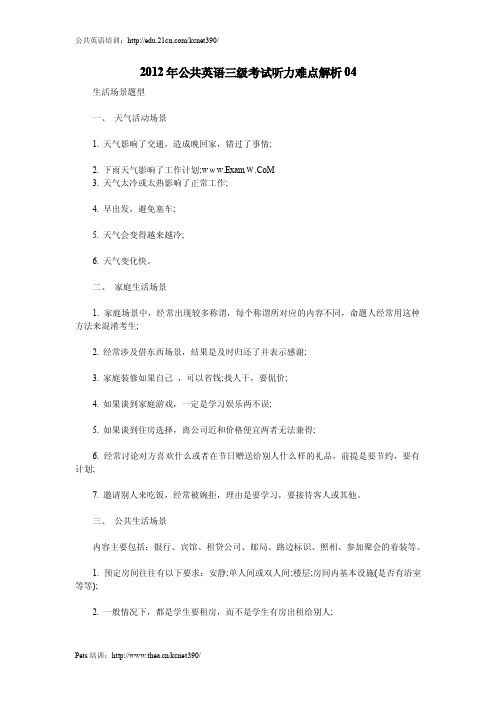
2012年公共英语三级考试听力难点解析04生活场景题型一、天气活动场景1.天气影响了交通,造成晚回家,错过了事情;2.下雨天气影响了工作计划;www.ExamW.CoM3.天气太冷或太热影响了正常工作;4.早出发,避免塞车;5.天气会变得越来越冷;6.天气变化快。
二、家庭生活场景1.家庭场景中,经常出现较多称谓,每个称谓所对应的内容不同,命题人经常用这种方法来混淆考生;2.经常涉及借东西场景,结果是及时归还了并表示感谢;3.家庭装修如果自己,可以省钱;找人干,要侃价;4.如果谈到家庭游戏,一定是学习娱乐两不误;5.如果谈到住房选择,离公司近和价格便宜两者无法兼得;6.经常讨论对方喜欢什么或者在节日赠送给别人什么样的礼品,前提是要节约,要有计划;7.邀请别人来吃饭,经常被婉拒,理由是要学习,要接待客人或其他。
三、公共生活场景内容主要包括:银行、宾馆、租贷公司、邮局、路边标识、照相、参加聚会的着装等。
1.预定房间往往有以下要求:安静;单人间或双人间;楼层;房间内基本设施(是否有浴室等等);2.一般情况下,都是学生要租房,而不是学生有房出租给别人;3.几个地点往往在对话中同时出现,对考生进行混淆,解题的关键在于要注意问题和事情发展的先后顺序;4.想拍好的照片,需要有好的用光(light)和胶卷(film);5.上班时的穿着叫正装(formal suit),休闲运动的服饰叫休闲装(casual jeans)。
四、学生学习生活场景(范围最广:包含考试、图书馆借书、听讲座等)五、教师场景(教师评价、教授忙)His lectures are excellent/fascinating.He really has a sence of humor.His lectures are I can hardly keep from falling asleep.I have my eyes on the watch the whole time.I didn’t catch...I couldn’t follow...练习:1.How much will the woman pay for the museum?[A]$6.00.[B]$10.50.[C]$15.00.[D]$9.50.2.What is the man asking the woman to do?[A]He wants to have a talk with her.[B]He asks her to see the director.[C]He asks her to see what she can do for him.中华考试网[D]He asks her to make a schedule for his meeting with the director.3.How many guests did they have last night?[A]75guests.[B]50guests.[C]30guests.[D]25guests.4.When dose the conversation take place?[A]On Friday.[B]On Thursday.[C]On Tuesday.[D]On Monday.5.What will the woman probably do?六、学生业余娱乐生活场景(看电影、看戏剧、获奖、毕业打算、约会见面)1.看电影、看戏剧;2.听说电影好、邀请看电影、电影没意思、电影看不懂、电影真不值;3.邀请去看电影,一般都不会接受,主要的理由是因为学习的问题,然后再表达一下惋惜的心情,通常会用虚拟语气;4.一方获奖了,另一方赞扬、敬佩。
英语等级考试pets三级听力试题讲解

英语等级考试pets三级听力试题讲解英语等级考试pets三级听力试题讲解如果学习只在于模仿,那么我们就不会有科学,也不会有技术。
以下是店铺为大家搜索整理的英语等级考试pets三级听力试题讲解,希望对正在关注的您有所帮助!第一部分听力理解第一节听下面5段对话。
每段对话后有一道小题,从题中所给的A、B、C三个选项中选出最佳选项,并标在试卷的相应位置。
听完每段对话后,你有10秒钟的时间来回答有关小题和阅读下一小题。
每段对话仅读一遍。
1. What does the man mean?[A] He must see his dentist.[B] He doesn't want to go to his appointment.[C] He will cancel his dental appointment.2. How does the woman feel about the party?[A] It was quite a success.[B] It was huge.[C] She thought it was terrible.3. What does the woman probably mean?[A] She needs someone to take care of her children.[B] She can't find her baby.[C] She prefers to sit down with her baby.4. What does the woman mean?[A] She thinks the tuition should be raised.[B] The semester's tuition is quite affordable.[C] She doesn't have enough money for her school fees.5. Where is the woman now?[A] In the hospital.[B] At home.[C] At the office.第二节听下面5段对话或独白。
最新外研社听力教程第三册听力答案Unit 4讲学课件

2:
1) The last seven known wolves were captured in the wild or taken from zoos to begin the breeding program.
2) The first captive-bred litter of Mexican gray wolves produced in the federal program was born at the wild Canid Center.
Exercise B
1. The New York Times won seven Pulitzer prizes.
2. The New York Times received this honor for its coverageபைடு நூலகம்of the September 11th attacks and the effects of the attacks on New York City and the United States and the war in Afghanistan.
3. It was established in 1917.
4. Yes, there were. They were the Wall Street Journal and the Washington Post.
5. Literary works is also recognized by the Pulitzer board.
6. They are John Adams and Empire Falls.
NEWS Item 2 Exercise A
This news item is about the Smithsonian’s Jazz Appreciation Month.
公共英语三级听力考试解题技巧附题型解析
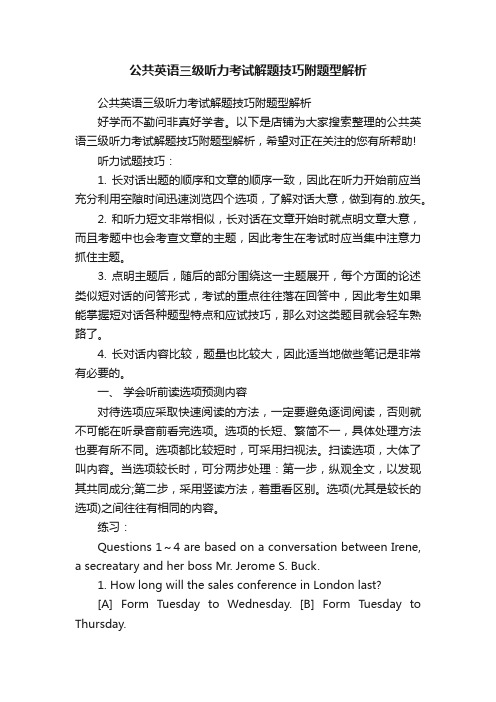
公共英语三级听力考试解题技巧附题型解析公共英语三级听力考试解题技巧附题型解析好学而不勤问非真好学者。
以下是店铺为大家搜索整理的公共英语三级听力考试解题技巧附题型解析,希望对正在关注的您有所帮助!听力试题技巧:1. 长对话出题的顺序和文章的顺序一致,因此在听力开始前应当充分利用空隙时间迅速浏览四个选项,了解对话大意,做到有的.放矢。
2. 和听力短文非常相似,长对话在文章开始时就点明文章大意,而且考题中也会考查文章的主题,因此考生在考试时应当集中注意力抓住主题。
3. 点明主题后,随后的部分围绕这一主题展开,每个方面的论述类似短对话的问答形式,考试的重点往往落在回答中,因此考生如果能掌握短对话各种题型特点和应试技巧,那么对这类题目就会轻车熟路了。
4. 长对话内容比较,题量也比较大,因此适当地做些笔记是非常有必要的。
一、学会听前读选项预测内容对待选项应采取快速阅读的方法,一定要避免逐词阅读,否则就不可能在听录音前看完选项。
选项的长短、繁简不一,具体处理方法也要有所不同。
选项都比较短时,可采用扫视法。
扫读选项,大体了叫内容。
当选项较长时,可分两步处理:第一步,纵观全文,以发现其共同成分;第二步,采用竖读方法,着重看区别。
选项(尤其是较长的选项)之间往往有相同的内容。
练习:Questions 1~4 are based on a conversation between Irene,a secreatary and her boss Mr. Jerome S. Buck.1. How long will the sales conference in London last?[A] Form Tuesday to Wednesday. [B] Form Tuesday to Thursday.[C] Form Wednesday to Thursday. [D] Form Thursday to Friday.2. What are they going to discuss at the meeting on Friday morning?[A] The trade in Scotland. [B] The industry in Scotland.[C] The new factory in Scotland. [D] The site of their new plant in Soctland.3. Where is Mr. Buck going to see Mr. Chambery, the European Manager?[A] In London. [B] In Paris. [C] In Rome. [D] In Madrid.4. Why must Mr. Buck be back on Friday?[A] It’s his daughter’s birthday. [B] It’s his son Sharon’s birthday.[C] It’s his wife’s birthday. [D] It’s his friend Sharon’s birthday.听力原文Questions 1~4:M:I think we’d better go over my schedule, Irene. I’m going to have a look at our European operation, as you know, and as I’ll be visiting a number of countries, I’d like you to make the bookings.W:Right, Mr. Buck. I’ll take down the details.M:Well, I’m leaving on Tuesday, April 15th, for London. I’m going to attend a sales conference for ou r British representatives. That runs through Wednesday and Thursday, and then there’s a reception at Canada House on Thursday evening.W:Are you going to meet the Ambassador, then?M:I guess so. But the main thing is that on Friday morning, I have a meeting with the British Minister of Trade and Industry.We’ re going to discuss the site of our new plant in Scotland.W:So when are you leaving for Paris?M:First flight on Saturday morning. I’m planning to meet my wife there. She’s going to fly over direct, a rriving in the afternoon. Then we’ll have a relaxed weekend before I see Mr. Chambery, the European Manager, on Monday. So from Paris on, I’ll need a double room.W:How long are you going to stay in Paris, Mr. Buck?M:Only till Monday evening. I’m going to Rome to see our plant there on Tuesday, and on Wednesday I’m due in Madrid to inspect the new factory.W:And that’s the last item on the agenda. So when are you coming back? Are you going to fly form Madrid?M:Yes, on the first plane out on Thursday. We must be back on Friday, the 25th. It’s my daughter Sharon’s birthday.答案:1.C 2.D 3.B 4.A【公共英语三级听力考试解题技巧附题型解析】。
PETS三级考试听力资料(4)
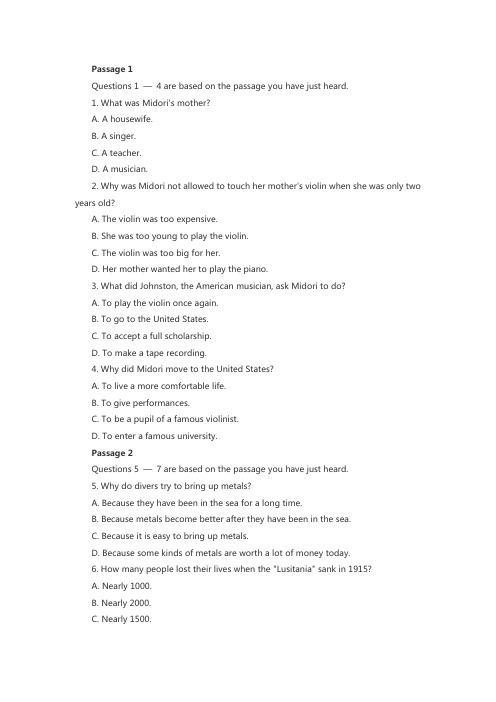
Passage 1Questions 1 —4 are based on the passage you have just heard.1. What was Midori's mother?A. A housewife.B. A singer.C. A teacher.D. A musician.2. Why was Midori not allowed to touch her mother's violin when she was only two years old?A. The violin was too expensive.B. She was too young to play the violin.C. The violin was too big for her.D. Her mother wanted her to play the piano.3. What did Johnston, the American musician, ask Midori to do?A. To play the violin once again.B. To go to the United States.C. To accept a full scholarship.D. To make a tape recording.4. Why did Midori move to the United States?A. To live a more comfortable life.B. To give performances.C. To be a pupil of a famous violinist.D. To enter a famous university.Passage 2Questions 5 —7 are based on the passage you have just heard.5. Why do divers try to bring up metals?A. Because they have been in the sea for a long time.B. Because metals become better after they have been in the sea.C. Because it is easy to bring up metals.D. Because some kinds of metals are worth a lot of money today.6. How many people lost their lives when the "Lusitania" sank in 1915?A. Nearly 1000.B. Nearly 2000.C. Nearly 1500.D. Nearly 2500.7. How much money will John Light get when he sells all the parts of the "Lusitania"?A. $1,2000,000B. $300,000C. $600,000D. $1,800,000Passage 3Questions 8 —10 are based on the passage you have just heard.8. Who opened the first McDonald's restaurant?A. A 56-year-old businessman.B. A man from the McDonald family.C. Two McDonald brothers.D. Ray Kroc.9. What community programs does McDonald's participate in?A. Programs for children and important patients.B. Programs for children and minority groups.C. Programs for children and the sick.D. Programs for children and the old.10. How much money did the McDonald's Corporation earn in 1982?A. About 8 million dollars.B. 2.7 million dollars.C. 6.7 million dollars.D. About 7 million dollars.答案解析1-4.听力原文:When Midori was two years old, she often climbed onto the piano bench and reached for the violin that belonged to her mother, a 38-year-old professional musician."Please don't touch, Midori," her mother scolded. The violin was, after all, worth more than $20,000.But Midori persisted; she longed to handle the graceful instrument that made beautiful sounds. Finally, on her third birthday, Midori was handed a package: a tiny violin, about half the normal size.Almost from the moment Midori was born, her mother knew she was sensitive to music. For several years mother and daughter practiced together day after day. She was eager to learn. Failure often led to tears, though she never once turned from the instrument. Instead, she persisted until the problem was overcome.One day Johnston, an American musician, heard Midori playing the violin. He couldn't believe she was just eight years old. "She must make a tape and I will take it to the United States," the musician said.A famous American violin teacher heard the tape. He, too, had difficulty believing his ears. The playing was absolutely astonishing. He immediately accepted her as a pupil and recommended her for a full scholarship. In 1982, Midori and her mother moved to New York city, leaving behind a comfortable life in Japan.正确答案:1. D 2. A 3. D 4. C解题思路:1.第一段直接提到她母亲是个音乐家。
大学英语三级B级(听力)模拟试卷4(题后含答案及解析)
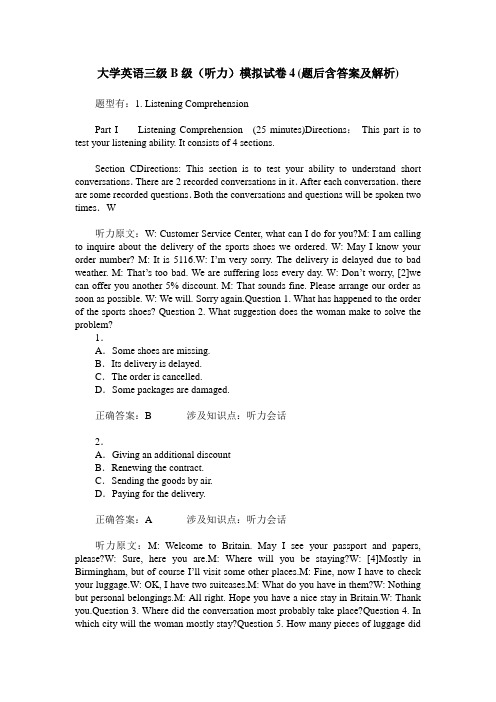
大学英语三级B级(听力)模拟试卷4(题后含答案及解析)题型有:1. Listening ComprehensionPart I Listening Comprehension (25 minutes)Directions:This part is to test your listening ability. It consists of 4 sections.Section CDirections: This section is to test your ability to understand short conversations.There are 2 recorded conversations in it.After each conversation.there are some recorded questions.Both the conversations and questions will be spoken two times.W听力原文:W: Customer Service Center, what can I do for you?M: I am calling to inquire about the delivery of the sports shoes we ordered. W: May I know your order number? M: It is 5116.W: I’m very sorry. The delivery is delayed due to bad weather. M: That’s too bad. We are suffering loss every day. W: Don’t worry, [2]we can offer you another 5% discount. M: That sounds fine. Please arrange our order as soon as possible. W: We will. Sorry again.Question 1. What has happened to the order of the sports shoes? Question 2. What suggestion does the woman make to solve the problem?1.A.Some shoes are missing.B.Its delivery is delayed.C.The order is cancelled.D.Some packages are damaged.正确答案:B 涉及知识点:听力会话2.A.Giving an additional discountB.Renewing the contract.C.Sending the goods by air.D.Paying for the delivery.正确答案:A 涉及知识点:听力会话听力原文:M: Welcome to Britain. May I see your passport and papers, please?W: Sure, here you are.M: Where will you be staying?W: [4]Mostly in Birmingham, but of course I’ll visit some other places.M: Fine, now I have to check your luggage.W: OK, I have two suitcases.M: What do you have in them?W: Nothing but personal belongings.M: All right. Hope you have a nice stay in Britain.W: Thank you.Question 3. Where did the conversation most probably take place?Question 4. In which city will the woman mostly stay?Question 5. How many pieces of luggage didthe woman have?3.A.At the Customs.B.At an information deskC.At a luggage claim areaD.At the waiting hall.正确答案:A 涉及知识点:听力会话4.A.Oxford.B.Cambridge.C.London.D.Birmingham.正确答案:D 涉及知识点:听力会话5.A.One.B.Two.C.Three.D.Four.正确答案:B 涉及知识点:听力会话听力原文:M: Excuse me. I would like to change rooms if possible.W: Sure, but could you tell me why?M: The traffic outside is too noisy. I couldn’t sleep at all last night.W: I am sorry to hear that, Which room are you in?M: Room 201.W: Can I put you into Room 206 on the opposite side away from the street? M: [2]OK.Question 1. Why does the man want to change his room? Question 2. Which room will the man move to?6.A.Because there was no access to the Internet.B.Because the traffic outside was too noisy.C.Because the air conditioner was out of order.D.Because there was no hot water in the bath.正确答案:B 涉及知识点:听力会话7.A.Room 201.B.Room 203.C.Room 204.D.Room 206.正确答案:D 涉及知识点:听力会话听力原文:W: Sales department of ABC Company, may I help you?M: Yes, we’re interested in your digital camera model DV3, how much does it cost? W: Well, 300 dollars each. M: Will the price be lower for large orders?W: Yes. If you buy more than 50, the price will be 270 dollars each. M: Do you give any discount if I pay within two weeks? W: Yes, we will give you a 3% discount. Question 3. What product does the man want to buy? Question 4. What’s the unit price if the man places an order of more than 50? Question 5. What is the discount if the payment is made within two weeks?8.A.TV sets.B.Music players.C.Desk top computers.D.Digital cameras.正确答案:D 涉及知识点:听力会话9.A.270 dollars.B.280 dollars.C.290 dollars.D.300 dollars.正确答案:A 涉及知识点:听力会话10.A.2 percentB.3 percent.C.4 percent.D.5 percent.正确答案:B 涉及知识点:听力会话听力原文:M: Hello, I need to open an account with you.W: Ok, will it be a checking account or a savings account?M: Savings accountW: How much will you deposit in it?M: 500 dollars.W: Ok, 500 dollars. Will you please show me your ID card?M: Here you are.W: Thanks, here is your bankbook.M: Thank you.Question 1. Where does the conversation most probably take place?Question 2. What is the man doing?11.A.In a store.B.In a company.C.In a travel agency.D.In a bank.正确答案:D 涉及知识点:听力会话12.A.Opening an account.B.Buying a ticket.C.Asking the way.D.Booking a hotel.正确答案:A 涉及知识点:听力会话听力原文:W: Sweet Home Furniture, can I help you?M: Yes, I’d like to buy a set of sofas. Are they on sale in your store?W: Yes, sir.M: But I don’t know where you are.W: Well, we are on Main Road. Bus No. 6 stops right in front of our store. M: I see. What discount can you offer? W:20 percent. It’s a great chance for you, sir. M: Fine.Question 3. What furniture does the man want to buy? Question 4. Where is the store located? Question 5. What’s the discount offered by the store?13.A.Sofas.B.Tables.C.Beds.D.Bookshelves.正确答案:A 涉及知识点:听力会话14.A.On Main Road.B.In front of the furniture store.C.Near the terminal of Bus No.6.D.Next to a discount store.正确答案:A 涉及知识点:听力会话15.A.10%B.20%C.30%D.40%正确答案:B 涉及知识点:听力会话听力原文:W: Hello. BBD Company. What can I do for you?M: Hello. May Ispeak to Mr. Zhou Ming?W: Sorry, he is away on a business trip.M: Oh, I see.W: May I take a message, sir?M: Please tell him to call me as soon as he’s back. My name is George Wilson. W: No problem.Question 1. Where is Mr. Zhou Ming now?Question 2. What did George Wilson ask Zhou Ming to do in his message?16.A.He’s in his office.B.He’s on holiday.C.He’s in the meeting room.D.He’s away on business.正确答案:D 涉及知识点:听力会话17.A.Call him back.B.Wait for his call.C.Send him an email.D.Visit him in person.正确答案:A 涉及知识点:听力会话听力原文:M: Now I’ll ask you some other questions, Miss Lee.W: Yes, please.M: What do you think of your present company?W: I could not say that everything is perfect there, but it has given me many chances. M: Then, why are you leaving your present job? W: Because your company is a global one and I like the international environment here. Question 3. What is the woman doing?Question 4. How does the women feel about her present company? Question 5. Why does the woman want to join the man’s company?18.A.Taking a job interview.B.Meeting a customer.C.Giving a welcome speech.D.Discussing a project.正确答案:A 涉及知识点:听力会话19.A.It is perfect everywhere.B.It offers her many opportunities.C.It has a good environment.D.It is a global company.正确答案:B 涉及知识点:听力会话20.A.She likes the environment there.B.She can have a higher pay there.C.The company is close to her home.D.The company offers a longer paid holiday.正确答案:A 涉及知识点:听力会话听力原文:W: Good afternoon, Sir. May I help you?M: Good afternoon. We’ve got a reservation.W: May I know your name, please?M: Bill Anderson. That is A-n-d-e-r-s-o-n.W: Just a minute please. Yes. Four people for two weeks, right?M: Yes. Where are the rooms?W: One double room is on the third floor, and two single rooms on the fourth. M: All right.Question 1. Where does the conversation most probably take place?Question 2. How many rooms has the man booked?21.A.Restaurant.B.PubC.Hospital.D.Hotel.正确答案:D 涉及知识点:听力会话22.A.One.B.Two.C.Three.D.Four.正确答案:C 涉及知识点:听力会话听力原文:W: Excuse me, Mr. Black. M: Yes? Is there anything wrong?W: Could you change your appointment with me this afternoon? M: What’s the problem?W: I’ll have to visit an important client this afternoon. It’s urgent M: Then, perhaps we can meet tomorrow. W: What time exactly?M: [5]How about tomorrow afternoon at two o’clock in my office? W: [5]OK.Question 3. What’s the problem with the woman? Question 4. What will the woman do this afternoon? Question 5. What time do the two persons finally agree on to meet each other?23.A.She has forgotten the man’s address.B.She cannot meet the man this afternoon.C.She has suddenly fallen ill with a bad cold.D.She cannot attend the training course this week.正确答案:B 涉及知识点:听力会话24.A.Visit an important client.B.Go to a department store.C.Attend a sales meeting.D.Move to a new office.正确答案:A 涉及知识点:听力会话25.A.At 1 p.m. tomorrow.B.At 2 p.m. tomorrow.C.At 3 p.m. tomorrow.D.At 4 p.m. today.正确答案:B 涉及知识点:听力会话。
- 1、下载文档前请自行甄别文档内容的完整性,平台不提供额外的编辑、内容补充、找答案等附加服务。
- 2、"仅部分预览"的文档,不可在线预览部分如存在完整性等问题,可反馈申请退款(可完整预览的文档不适用该条件!)。
- 3、如文档侵犯您的权益,请联系客服反馈,我们会尽快为您处理(人工客服工作时间:9:00-18:30)。
(3) 注意对话的时态和重复出现的词,它们往往是解题的重点;
4. 实例分析 (2007.9)
(1) 录音材料
M: I am wondering why no cure has been found for the common cold.
W: There are many medicines in the drug stores which are helpful.
C. The bag is not heavy at all. D. She is waiting for the elevator.
(二)行动与计划题
1.题型特点
行动与计划题是PETS三级听力考试最常出现的题型之一,题量也比较大。题目一般是问某人将来的计划或正在做什么,某人发生了什么事情,有时也问某人做某事句,比如:what +某人+try to do/ intend to do; what did/ will +某人+do? 而四个选项一般是动词,动名词或不定式短语,或者是主语相同,而动词开始不同。
(三)因果关系题
1.题型特点
因果关系题也是PETS三级听力考试经常考查的题型之一,它主要是对出现某种结果的原因进行提问。四个选项表达的意思大不相同,通常是完整的句子,并且经常由because, became of 来引导,有时也用不定式短语来表示。
2.常见提问方式
Why does the woman want to change her job?
Why does the woman reject the man’s invitation?
Why does the woman want to by some plants?
Why did he go to the United States?
Why didn’t the woman like the train?
Why is the woman upset?
…
3. 解题指南
(1)考查重点是原因,往往是第二个人说的为重点。(特别要注意听but 等的转折处);
(2) 熟悉表示因果关系的词或短语。如:because, since, for, so, as, cause, because of, now that, due to, thanks to, owing to, as a result of, give rise to(_引起,引发,导致) , be responsible for(形成…的原因), result in , result from, so that…, such…that… as a consequence;
M: But none of them works on me.
(2) 试题
What is the man doing?
A. Buying some medicine. B. Giving a lecture on cold.
C. Complaining about his illness. D. Talking about medical development.
(3)大家应该重视but 后面的信息,因为它们往往是原因所在;
(4)选项往往用同义词表达或同等的表达方式,而一般不会直接给出。
4.实例分析(2007.9)
(1)录音材料
M: Madam, the elevator is out of order. Would you like me to take you bag upstairs?
2.常见提问方式
What will the speakers do tomorrow morning?
What is the woman try to do?
…
3. 解题指南
(1) 留心选项中每个动作及动作对应的人和时间;
(2) 抓住对象中表示对象先后顺序的连词、介词、及副词;
W: Thank you. But I’m waiting for my daughter here.
(2)试题
Why does the woman refuse the man’s help?
A. Her daughter tells her to do so. B. She is not going upstairs now.
